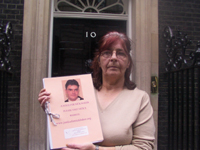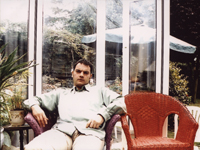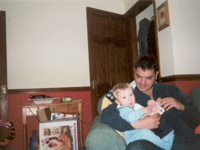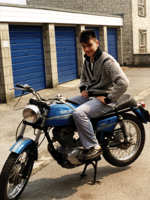And Justice for All...
Back to Contents of Issue: November 2003
|
|
|
|
by Leo Lewis |
|
 THE DRUG SMUGGLING CASE of Nick Baker, a 32-year-old former sandwich-shop manager from the small British town of Cirencester, has many flaws deeply rooted in both Japanese legal procedure and police investigation.
This July, Baker was jailed for 14 years and fined more than JPY2 million. His crime? Allegedly carrying a suitcase with JPY1.4 million worth of drugs through Tokyo's Narita Airport in April of last year.
Baker claims he was on his way to Japan for a bit of pre-World Cup tourism and that the bag -- loaded with the biggest synthetic drugs haul in Narita's history -- was foisted on him by a traveling companion.
Baker's defense was that he was duped by a man named James Prunier. Prunier now claims that Baker knew what he was doing.
The Baker case is not straightforward, and J@pan Inc is not attempting here to hold its own retrial.
What we do know is that the original court proceedings have been condemned around the world for their failure to deliver a fair trial. And it emerged some time ago that Prunier has been involved in other drug-smuggling incidents and that other defendants have successfully argued that they were tricked by Prunier into becoming his "mules." That crucial bit of evidence was not admitted by the Japanese court.
We were in the cavernous Chiba courthouse back in July to watch the 14-year sentence being handed down. From early in the day it was clear that, in order to claim its status as one of the three pillars of democracy, the Japanese legal system needs to get its house in order.
Here was a case in which the eyes of the world had turned on Japan. Was the court capable of performing a fair trial? Was it true that the judge had never, in his professional career, acquitted anyone? Do the police beat such comprehensive "confessions" out of their prisoners? Would Baker be given proper access to the medical treatment he needed? Why had Baker been denied access to English language documents and interpreters? Why had he spent nine of the past 12 months of imprisonment in solitary confinement? Why had his mental state been allowed to deteriorate so dramatically?
Of course, as it turned out, we are not members of that particular Chiba District Court Kisha Club. Not many people are, it seems. About five local reporters are members of this little cabal, but CNN, the BBC, The Times of London, the New York Times and a variety of other media groups were not entitled to enter as members of the press.
Instead, we had to draw straws in a lottery to sit with members of the public. It was a crowded day, and many media groups were forced to wait outside.
When Baker was finally led in, still wearing the casual clothes of a tourist, he was visibly not the man he had been 12 months before. Throughout the nearly two hours it took to read the judgment, Baker shook and twitched, occasionally tearing at his hair and weeping. His mother, Iris Baker, has repeatedly maintained that her son suffered a mental breakdown while in solitary confinement. Based on physical appearances alone, it was hard not to agree.
To the stunned amazement of everyone in the room, the judge mentioned the name Prunier. Yet he never mentioned the critical evidence.
The judge would not accept an argument from Baker's lawyer that the evidence of a Belgian court -- where three people had been acquitted for similar smuggling charges because they had been duped by Prunier -- was admissible in this case.
Instead, the judge spent a long quarter of an hour describing Prunier's position within a shadowy global drugs conspiracy.
(This was suspiciously vague. If this were a genuine tip-off from the Chiba judge, wouldn't the Japanese police have begun a dragnet investigation of Prunier's global crime network? Of course, nothing has been done.)
James Prunier
But Prunier, who remained silent while the Japanese case took its course, strongly protests his innocence and contends that he didn't trick Baker.
"Clearly the story everyone's read about is his version of events," Prunier says now. He is currently on bail awaiting trial for drug trafficking offences in Belgium. "What [Baker] has done is blame me. He says I swapped his suitcase at the airport. I didn't.
"Nick knows what happened, he really does. And I know what happened. I just can't tell the whole story. But the idea that I set him up and put somebody in prison -- a friend or not a friend, anybody in the world -- the thought that I would do that is the pits."
Since the news broke, Prunier has received death threats, but he says he will not be driven out of Stroud. He denies claims that he has tricked other people into carrying drugs through customs and to destinations worldwide.
"I've been told personally by people that I know are capable of knowing these things, that there's money on my head again. I've had death threats over the phone. I'm no angel but I'm certainly not guilty of setting people up.
"I really want to see [Baker] over here," he adds. "I don't want to see him in prison in Japan. I think about him every minute of the day."
Iris Baker
The final blow was Baker's sentence: a whopping 14 years of imprisonment -- or the same length of time given to brutal double murders. The judge argued that the quantity of drugs involved, 41,000 ecstasy tablets, meant that Baker's punishment had to serve as an example to others.
Baker was led out of court with a look of stricken desperation on his face, screaming to the assembled press: "How can they do this to me?"
Since his imprisonment, much has been put into motion. Baker's lawyer is preparing an appeal, and his family has placed itself at the center of a powerful crusade for justice.
The group traveled to London to get their message across to Blair, handing over a 1,000-name petition urging the British government to intervene. They then staged a further protest at the gates of the Japanese Embassy.
"If the government wasn't so busy sending more troops out to Iraq," says Iris Baker, "maybe it would have time to look at what I'm saying."
The petition, which was also signed by five members of the European Parliament, asks Blair to "use all the influence your good office can muster to secure Nick's right to a trial which follows internationally accepted standards."
Fellow campaigners include MEP Baroness Sarah Ludford and the International Fair Trials Abroad charity. Both have been urging the British government to put pressure on the Japanese, and both have made trips to Japan to fight for Baker's cause.
The British Embassy in Tokyo also threw its weight behind Baker's plight, demanding that the Japanese Ministry of Justice and the Foreign Ministry clarify exactly why Baker had been held in solitary confinement and denied the medical treatment he needed.
The issue was so contentious that a first-ever meeting was held to discuss the issue of prisoner treatment in Japan.
Baroness Ludford argues that it's blatantly clear Baker has not been given proper justice. "Nick was treated as presumed guilty," she says. "No one is making demands to let a guilty man go free; we are just asking that he receive a fair trial. Our government has been far too passive. It is simply not enough to say that our government cannot interfere with another country's justice. We are talking about a country which is a major developed nation, and an ally."
Baker's campaigners, however, do not hold much hope that their petition will be successful. "They [the British government] say, 'we cannot interfere with judicial sovereignty of another country,'" says Iris Baker. "That's a lie. We know international governments now talk to each other." She says the methods Prunier used to befriend her son were the same as those he was convicted of using in the Belgium case, and she wants this evidence to be heard in the Japanese courts.
"I need the Japanese authorities to request the evidence from Belgium. The police there are waiting to give it to the Japanese. They really want to help Nick, for it was Nick's statement to the court in Belgium that helped them to convict this man (Prunier)," she says.
Sarah de Mas, deputy director of Fair Trials Abroad, agrees that there are still a number of questions to be answered. "The defense did not have the same access to justice as the prosecution," she says. "No one asked the basic question of why Nicholas would have picked up a bag that didn't belong to him if he knew it contained drugs. Nicholas was seriously compromised by being given a poor translator. And we are also concerned by the way he was treated. There was no reason for him to be kept in solitary confinement. It damaged his mental state and has made it impossible for him to reasonably prepare for his trial."
Japan recently ratified an international agreement allowing prisoners to apply to serve their sentences in their own countries. According to the British Embassy, all 27 UK prisoners in Japan have applied -- except for Baker.
Iris Baker is now working an extra day a week to raise the money that would allow her son to make that application. She looks after George one day per week and spends much of her "free" time on the computer, exchanging emails with the Belgian police and well-wishers and trying to raise funds. The new house she and her partner, John, moved into earlier this year is still full of unpacked boxes.
"I feel dead inside," says Baker, her voice without emotion. "Everything inside me is a blank. I dread each day. I open my eyes and I don't have to wait for it to be on my mind -- it just is."
As Iris Baker and the many campaigners who have joined her have discovered, the Nick Baker case has done a great deal more than expose the glaring imperfections of Japanese justice. The campaigners have a considerable petition behind them, plenty of press attention and a strongly sympathetic ear among any foreigner who has had the misfortune of undergoing trial and sentencing in the Japanese system.
But Baker does not have the most critical support he needs. His case, unlike those of so many Britons convicted and imprisoned around the world, has fallen short of becoming a political issue in the UK. Nurses facing execution in Saudi Arabia or students planted with drugs in Vietnam quickly produce a line of ministers willing to champion their plight. Baker has not mustered support from anyone within the leading Labor Party.
Politics
A more cynical possibilty is that British politicians know there is too much to lose by falling out with Japan over a drug smuggling case. The most significant recent development in Baker's campaign for justice was a purely negative one: Tony Blair could have brought the issue up when he visited Japan in July, but he chose to stay silent.
Britain and Japan enjoy an almost trouble-free international relationship. For Blair to have created conflict amid the Iraq maelstrom would have been political folly. Instead, when the two Prime Ministers met in the resort town of Hakkone, they discussed matters of tourism.
The Ministry of Justice and Foreign Ministry were both approached for comment during and after the Baker case, but both declined.
Japan's courts have a conviction rate of 99 percent.
Life on The Inside
Some of Japan's most savage killers are held at the Chiba prision, which is notorious for its rigid regime. Hundreds of deaths are said to occur inside its walls every year.
"My days start as they end, lonely and full of anger," says Baker. "I open my eyes after around four hours' sleep. It is still dark outside and there is a stranger lying next to me.
"Horrible smells fill the air, and I look up at the mold and filth on the ceiling and walls, and I can almost understand why people are pushed to take their own lives or even kill others in this archaic and barbaric system. I turn to God for help, to get me through another never-ending day. It is impossible to put into words the total numbness, emptiness and desperation of not being with my son. I know a man isn't supposed to cry, but that's how I spend my days. I think of my family and wonder what they might be doing, of George around at our next door neighbors' house, chasing their daughters around. Or maybe Bev will be bathing him or reading George a story and I wish to be home more than ever. I try to put myself there with them, but I can never touch them and hold them."
His days are long and uneventful, leaving him unaware of time.
"After lying awake for what seems like forever, we are allowed to get up, and my day just gets ever worse," Baker explains. "The guards come around and clean our cells -- well, what they call cleaning the cells.
"We sleep on inch-thick mats, which are our beds and which rest on the concrete floor. Then it's roll call, when we have to sit cross-legged and call our name out when shouted to -- any mistakes can lead to punishment."
His breakfast, like all of his meals, is served in his cell and consists of dirty rice with a thin soup containing a few morsels of fish.
Referring to the absence of medical treatment, Baker describes constant pains in his spine and only brief periods in the fresh air.
"If we are lucky, we get up to one hour of exercise a week in a small area with about 50 others," he says. "This actually means standing alone, as there's no room to exercise and no other British people to talk to.
"But even this is better than solitary confinement, where I got to exercise alone in an area you wouldn't let a pet rabbit run around in."
The opportunity to wash is also infrequent. "At the moment, we are only allowed to wash three times a week. Lately they installed showers -- although only a small number, so if you don't get one, you only get the communal bath water, which can be filthy from all the other people who have been in it before you," he says.
"Most people here have some kind of foot fungus, scalp disease or rash, and they are passed from person to person.
"Then they are either too stupid or too proud to get it treated, or fear they will be moved into isolation. It becomes a never-ending circle.
"Lack of contact means that I am slowly losing my grip on reality and feel my sanity is slipping down into a pit of hell.
"I have been threatened and spat at -- they seem to think this is part and parcel of how to treat human beings. They refer to me as the 'alien.'"
When asked about the circumstances of his arrest, Baker is hesitant to talk too much, mainly, he says, because his letters -- the only access he has to the outside world -- are vetted carefully by the prison guards.
His final line is a plea to the British Prime Minister: "It is time Mr. Blair did more about [the situation] here [in Japan] -- just as he has in other countries." @
For more information, visit: www.justicefornickbaker.org |
|
Note: The function "email this page" is currently not supported for this page.


 The first reminder that Japan is not set up for democratic processes came before we even entered the courtroom. We are fully accredited members of the foreign press, with our names duly registered with the Ministry of Justice. We have ID cards that would get us behind police lines at any sort of incident and that would get us into the press gallery of a court anywhere else in the world.
The first reminder that Japan is not set up for democratic processes came before we even entered the courtroom. We are fully accredited members of the foreign press, with our names duly registered with the Ministry of Justice. We have ID cards that would get us behind police lines at any sort of incident and that would get us into the press gallery of a court anywhere else in the world.
 When the incident took place, Baker had told police that the bag belonged to Prunier, who was still in the airport. The police did not detain Prunier at the time. In fact, they allowed him to leave the country without ever being questioned.
When the incident took place, Baker had told police that the bag belonged to Prunier, who was still in the airport. The police did not detain Prunier at the time. In fact, they allowed him to leave the country without ever being questioned.
 In September, Iris Baker called on 10 Downing Street, Prime Minister Tony Blair's residence, in a bid to secure a fair trial for her son. With her was Nick Baker's partner, Beverley, and his two-year-old son, George, whom he has not seen since the baby was 6 months old.
In September, Iris Baker called on 10 Downing Street, Prime Minister Tony Blair's residence, in a bid to secure a fair trial for her son. With her was Nick Baker's partner, Beverley, and his two-year-old son, George, whom he has not seen since the baby was 6 months old.
 Hope?
Hope?
 "I am, as my mother says, totally tired and weary, both mentally and physically," he says. "Laying here on a hard floor in the kennel, I sometimes hear planes flying overhead and pray to be on one heading home."
"I am, as my mother says, totally tired and weary, both mentally and physically," he says. "Laying here on a hard floor in the kennel, I sometimes hear planes flying overhead and pray to be on one heading home."



